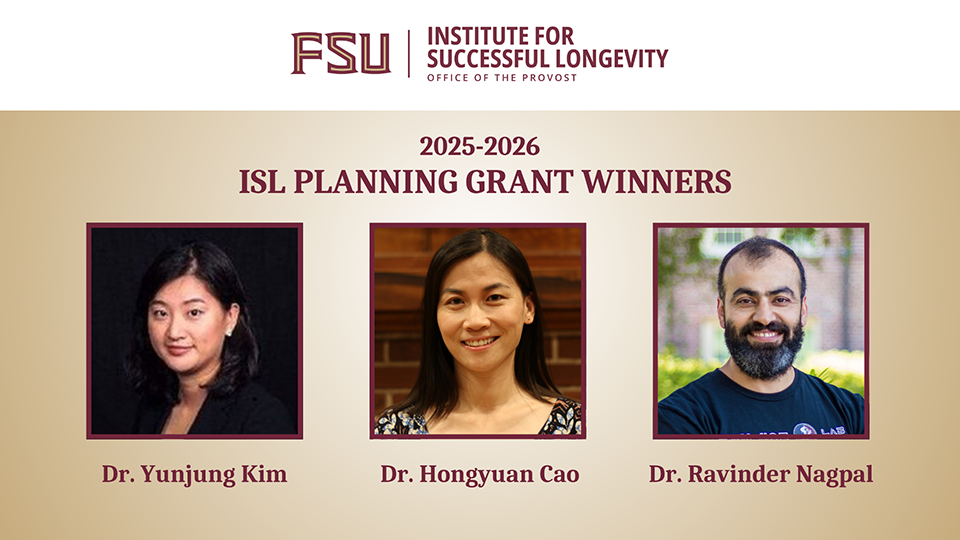The Institute for Successful Longevity Awards 2025 Planning Grants to Faculty Affiliates

The Institute for Successful Longevity has awarded 2025-2026 Planning Grants to three teams led by ISL Faculty Affiliates Dr. Yunjung Kim, Dr. Hongyuan Cao, and Dr. Ravinder Nagpal, respectively.
The ISL Planning Grants provide $25,000 in funding for interdisciplinary teams in a new direction or for continuing support of existing projects, all with the goal of enhancing the opportunity for successful longevity.
Dr. Yunjung Kim, Professor in the School of Communication Science and Disorders, will collaborate with Co-PIs Dr. Erin Bush, Associate Professor in the School of Communication Science and Disorders and Dr. Victor DeBrunner, Professor in the Department of Electrical and Computer Engineering. In Dr. Kim’s project titled “Bridging Bench Science to Clinical Practice: Exploring Ultrasound Imaging for Articulation Studies in Parkinson’s Disease”, the team will leverage ultrasound imaging as a form of biofeedback to improve speech interventions for individuals with Parkinson’s disease. The project aims to establish a technology-assisted articulation training program, offering a cost-effective, accessible, and innovative approach to aging research and clinical therapy.
Dr. Hongyuan Cao, Professor in the Department of Statistics, will be working alongside Co-PIs Dr. Qian Zhang, Associate Professor in the Department of Educational Psychology and Learning Systems, and Dr. Antonio Terracciano, Professor in the Department of Geriatrics. In Dr. Cao’s project titled “Exploring the Paradoxical Link Between BMI and Alzheimer’s Disease Risk”, the research team will investigate the evolving relationship between body mass index (BMI) and Alzheimer’s disease (AD) across different stages of life. While mid-life obesity is often linked to increased AD risk, late-life obesity may be associated with reduced risk. This project proposes modeling the time-varying effect of BMI on the onset of AD to identify specific life periods where BMI plays a critical role. These insights will enable more precise and effective interventions aimed at reducing AD risk.
Dr. Ravinder Nagpal, Associate Professor and Director of The Gut Biome Lab in the College of Education, Health, and Human Sciences, will work with Co-PI Dr. Julia Sheffler, Assistant Professor and Director of the Integrative Science for Healthy Aging Program at the Center for Translational Behavioral Science. In Dr. Nagpal’s project titled “Unraveling the Gut-Microbiome-Brain Axis Elements Through Multi-Omics Assessments in Older Adults with Mild Cognitive Impairment”, the researchers will build on their existing I-CAN (“Improving Cognitive Aging through Nutrition”) program. The study will use a comprehensive multi-omics approach to investigate how dietary patterns and microbial metabolites impact brain and gut health in underserved older adults with mild cognitive impairment. This work is expected to fill crucial gaps in our understanding of how the gut-microbiome-brain axis influences cognitive aging.
Congratulations to all the winners of the 2025-2026 ISL Planning Grants, and thank you to ISL’s grant reviewers for their thoughtful evaluation of the proposals!












